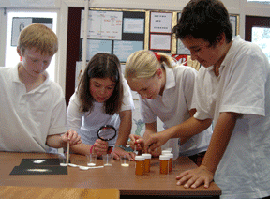![]() THE
NEMP PERFORMANCE OF HIGHER ACHIEVING STUDENTS
THE
NEMP PERFORMANCE OF HIGHER ACHIEVING STUDENTS
![]()
Gordon
Knight
It is not possible to identify directly from the NEMP reports
particular aspects of the performance of the Year 4 and Year 8
students who participated in the NEMP assessments and achieved
the higher scores. However, we can identify the areas these students
found difficult by examining those items of the NEMP general education
assessments where students’ overall performance was weakest.
The study reported here drew items from all subjects (except Art)
included in the two NEMP assessment cycles of 1995 to 2002. |
Items on which
student performance was weakest (i.e., less than 25% of the students completed
them successfully) were identified, and it was assumed that at least some
of the ‘higher achieving students’ (i.e., those in the upper
quartile of the particular assessments) would not have completed these
items successfully. The results from the two cycles of assessment in each
subject area were then combined, and each identified item classified by
the essential skills required for its successful completion.
![]()
| • Numeracy
skills, physical skills and knowledge skills were a significant
feature of the more difficult items in particular subject areas,
but were not major difficulties across the curriculum. |
![]()
Communication and problem-solving are the generic skills most likely to
challenge more able students. Often, both skills are required. A question
asking a student to explain something is likely to involve reflective
thinking followed by communication. The same is true the other way round:
a question asking a student to listen to, or read, an explanation and
then indicate that they have understood it, requires communication followed
by reflective thinking followed, perhaps, by more communication. This
interaction between thinking and communication may be an important way
of best challenging more able students.
